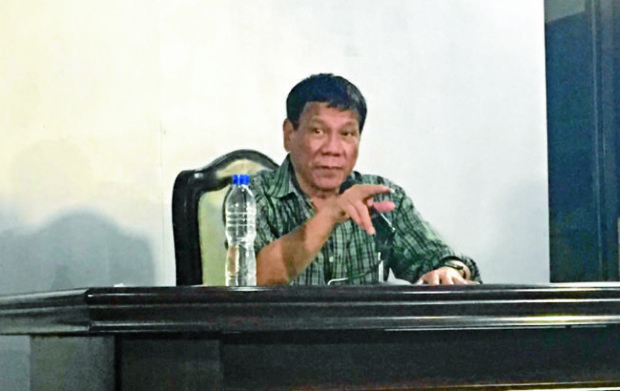
President-elect Rodrigo Duterte during a press conference after his first cabinet meeting at the Malacanang of the South in Panacan, Davao City. PHOTO BY TARRA QUISMUNDO
DAVAO CITY – President-elect Rodrigo Duterte on Tuesday blamed corruption in the media and irresponsible reporting for the killings of journalists in the country.
In his first press conference at the presidential guest house in Barangay Panacan, Duterte recounted the killing of a broadcaster in Davao City to stress his point.
Duterte said the broadcaster was murdered because of his alleged irresponsible reports and connection to political operators who paid him to attack public figures.
He said it is a sad reality that some reporters are accepting bribes to attack or defend politicians or public officials.
“Kaya namamatay kasi nabayaran na they take sides or nasobrahan nila ang atake,” Duterte said.
“It’s not because you’re a journalist you’re exempted from assassination if you’re a son of a bitch,” he added.
Duterte said the freedom of expression enshrined in the 1987 Constitution will not protect reporters from assassination if they are corrupt or careless in reporting.
“The Constitution can no longer help you pag binaboy mo isang tao. Your freedom of expression can’t help you if you’ve done something wrong with the guy,” Duterte said.
Duterte’s hard stance on the issue gives a preview of how his administration would treat the problem of media killings, which remains rampant in the country.
At one point during the press conference, Duterte was apparently irritated by a barrage of questions from the media that he said: “May sundalo ba rito? I-Armalite nga mga ito.”
At least 32 journalists have been killed since President Aquino came to power in 2010.
The latest victim was Alex Balcoba, a reporter of People’s Brigada, who was killed in Manila on May 28.
Ryan Rosauro, chair of the National Union of Journalists in the Philippines, said he “took exception to the pronouncements of President-elect Duterte that tends to suggest it is okay to get a journalist killed if he or she is involved in a corrupt practice.”
“We would like to stress that extra judicial killing will not eliminate media corruption which is a systemic problem as much as a question of professional ethics,” Rosauro said.
“We also stress that journalists were killed because of their work in exposing corruption and malfeasance in government. Hence, no matter the weaknesses of Philippine media, it will be a major factor in any effort to cleanse government of the scourge of graft and corruption,” he added.